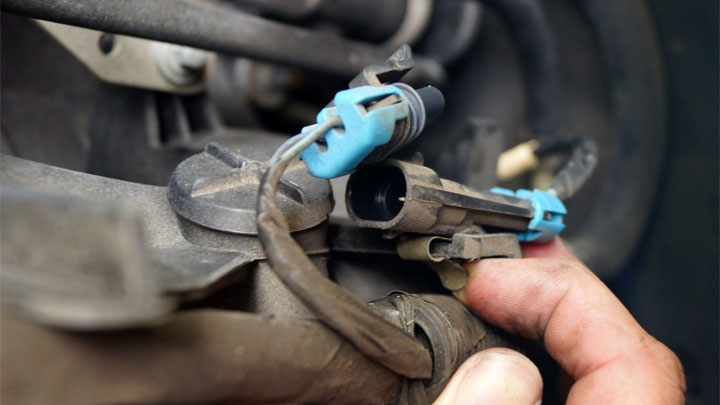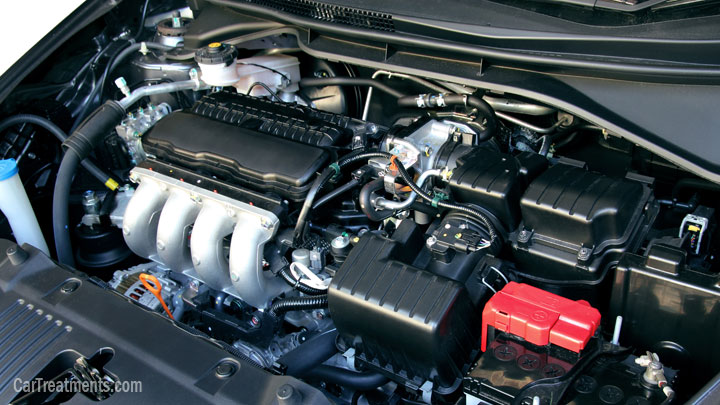4 Symptoms of a Bad Knock Sensor (and Replacement Cost)
You’re thrumming along a long country road, of course, and you can’t really tell what’s going on in your engine bay. That’s because everything is so quiet nowadays.
But you do see a check engine light that wasn’t there before or maybe you feel a strange bumping sound upon acceleration. Maybe your mileage has gone downhill fast, or something just doesn’t feel right.
While the problem could be a variety of things, a bad knock sensor could be the culprit.

What Is a Knock Sensor?
A knock sensor is a small circular device located on the block or intake manifold of most internal combustion engines. The bottom of the sensor is threaded unto the actual block or manifold, and the top of the sensor is comprised of a silicon donut, a piezoelectric crystal, and then an electrode.
Your car’s computer is constantly hearing and recognizing every sound that is going on in your engine compartment. The sounds are important because there will be normal, and abnormal sounds. The latter signifies some sort of problem in the engine bay, which will then throw an engine code on your dashboard.

Another type of knock sensor is an Ion sensing. It’s a novel idea used on some BMW, Ferrari, and other higher-end vehicles.
The method essentially throws current across the spark plugs and detects any sort of differential in current, which could indicate a detonation that’s out of the norm. This isn’t a widely used method, but still super cool!
Related: 51 Types of Car Sensors (and What They Look Like)
What Does a Knock Sensor Do?
So, that’s more of a general explanation of how sensors communicate with the driver of a motor vehicle, but what exactly does a knock sensor do?
Essentially, it will let you know if there is a misfire or weird combustion that isn’t in line with the other engine sounds. You’ll see a check engine light more than likely, but if you don’t and the car still feels strange, then take the car to your trusted mechanic.
Where Is the Knock Sensor Located?
Although a knock sensor is frequently found immediately attached to the engine block’s exterior, it can also occasionally be found tucked away beneath the intake manifold. It is advised that you reference a model-specific repair manual as the precise placement of the sensor may vary depending on the vehicle.
Bad Knock Sensor Symptoms
#1 – Strange Feeling When Accelerating

One indicator that your knock sensor has gone bad is that your car will feel strange when you are accelerating, or when you load it with more gear than usual.
To test this, get the car up to operating temperature. Now, when you next press on the gas, try paying attention to how fast the tachometer is moving through the RPM (revolutions per minute) range.
If you feel some stuttering upon acceleration and it’s not as smooth as it once was, it could be your knock sensor.
#2 – Poor Gas Mileage

Another symptom that your knock sensor is bad is if you suddenly start to get very poor gas mileage.
Since you’ve obviously been keeping meticulous mileage data for every tank (I know I do!), you’ll know within a microsecond when your miles per gallon starts to decrease. Well not really, but you get the idea.
This is because your car’s computer notices a faulty sensor and will then make your engine run less efficiently by changing the timing.
#3 – Check Engine Light

This one is probably the easiest to notice: if your knock sensor goes bad, you’ll just see a check engine light.
With most cars, it will just be a solid light, but if it’s flashing check your manual for what that means for your specific vehicle. At that point, take the car to your favorite, reliable mechanic. DTC P0325, DTC P0326, DTC P0327, DTC P0328, and DTC P0332 are a common trouble codes for a knock sensor malfunction.
#4 – Slow Timing

The final symptom of a bad knock sensor is in my opinion the coolest, and I’m totally geeking out about it. Once your knock sensor goes bad, your car will effectively slow down the timing just enough to not do any further damage to the car, but enough so you’ll be able to get to a mechanic.
Another interesting bit is if you have an EcoBoost, high compression motor like Mazda’s SkyActiv tech, or flex-fuel engine, you’ll experience more of an effect when the knock sensor goes bad.
Can a Faulty Knock Sensor Cause a Misfire?
Yes, a faulty knock sensor can cause a misfire. This is simply because it can cause the engine control module (ECM) to incorrectly adjust the engine timing. When that happens, engine misfires can occur.
To confirm, temporarily disconnect the knock sensor (which you can reach from underneath). The ECM will then default to less aggressive timing maps. If the knock sensor is the issue, the car will run rather conservatively and may feel sluggish, but the misfire should go away.
Knock Sensor Replacement Cost
Best places to order parts? See: 19 Best Online Auto Parts Stores
For an average vehicle, the cost of replacing your knock sensor at a shop is anywhere from $120-$500. This is comprised of parts that will generally cost between $65 and $200, and the labor, which will range between $55 and $300.
Replacement Process
If you have some mechanical experience and want to do it yourself, just factor in an hour or two of your own time to replace that pesky sensor. YouTube is often a big help as well.
First, take a ton of pictures with your phone so you have a reference for what things are supposed to look like when all put together. Make sure you disconnect the battery and get other hoses, wires, and brackets out of your way. You’ll thank yourself later.
Then, make sure you get the replacement sensor first and find where your broken one is. This might seem stupid, but make sure you got the right part and that it at least looks right. I can’t tell you how many times I’ve picked up the wrong part and it was a total crapshoot from there on in.
Once you’ve replaced the sensor, check out that picture you took earlier, and put all the bits back in place. Now, reconnect your battery and start your car to see if that CEL has gone away.
Related: 8 Best Wire Strippers (for Automotive Work)
What Causes a Knock Sensor to Go Bad?
Generally, the knock sensor will go bad with improper handling. Maybe you’re working on the car and bump it with a wrench or in the process of replacement, you drop it.
Also, like other sensors, corrosion or wear and tear of the sensor’s internal components may cause failure.
Finally, if for some reason you disconnect and reconnect it with the battery connected, you may simply fry it. Just be careful with these sensors, and they should last the life of the engine.
Can I Drive With a Bad Knock Sensor?
You can technically drive with a bad knock sensor, but depending on how much your motor relies on it, you won’t get very far and you’ll burn a ton of gas.
When the knock sensor goes bad, it is very important that you get it replaced. This is because it is dangerous to run your motor with a faulty knock sensor and in certain cases, it could result in you not finding out a catastrophic engine failure fast enough. Then you have a totaled car.
Preventing Knock Sensor Issues
In order to prevent future knock sensor issues, it’s important to take care of your engine by following a few recommendations.
Maintaining Fuel Quality and Octane Level
Using the right fuel for your engine is essential to its performance and longevity. High-quality fuel with the correct octane number can help prevent knock sensor problems and improve engine performance. Low octane (or low quality) fuel can cause an increase in combustion temperatures, which may lead to engine detonation and trigger the knock sensor.
Most vehicles require regular unleaded gasoline, while performance or luxury vehicles may require premium or high-octane fuel. Even the level of ethanol in the fuel can have an effect. Be sure to consult your owner’s manual to determine the proper fuel for your vehicle.
Keeping Engine Clean and Reducing Carbon Buildup
Carbon buildup in the engine, particularly on the intake manifold and cylinder head, can cause hot spots and increase the chances of engine knock. These hot spots can trigger the knock sensor, leading to decreased acceleration and potentially even damage to the sensor itself.
To mitigate these issues, regular maintenance of your vehicle is necessary. This may include using fuel additives to help clean your engine, changing the air filter as needed, and ensuring proper intake and exhaust systems maintenance.
By addressing carbon buildup and keeping the engine clean, you help maintain a properly functioning knock sensor and overall engine performance.
Following Manufacturer Recommendations for Sensor Replacement
Occasionally, knock sensors may fail due to factors beyond your control, such as manufacturing defects or age-related wear and tear. The best way to prevent issues related to faulty knock sensors is to follow the manufacturer’s recommendations for sensor replacement.
Consult your vehicle’s owner’s manual or service schedule to determine when it’s time to replace the knock sensor.
- How to Reduce Wind Noise in Your Car (Locate the Source) - Nov 22, 2023
- How Long Can You Drive on a Spare Tire? (and How Fast Can You Go?) - Sep 13, 2023
- Why Is My Electronic Stability Control (ESC) Light On? - Apr 3, 2023

Hi I have a 2014 Kia Rio that recently had a code P0326 pop up. I had the knock sensor replaced by a mechanic and as I was watching I noticed he didn’t disconnect the negative battery terminal before replacing the part. I’ve tried clearing the code with my scanner and disconnecting and reconnecting the battery to allow it to reset, but is it likely that upon installation it was damaged due to the battery not being disconnected beforehand?
I doubt there’s any damage to the sensor from not disconnecting the battery. The code could be caused by an issue in the wiring, and not the sensor itself. For instance a short or bad ground could throw a code because the voltage reading from the sensor would be wrong.
I have a 07 5.7 hemi. I had to replace my cylinder 1 and 3. I might have accidentally hit it or something I don’t know exactly. I had a knock retard at -8° the volts were at .8ish
Another frame I had a retard knock of 4.5° the first sensor being at 4.6v while the 2nd one is at .9v
The question is my knock sensor bad? Or should I look back at my pistons and see if they are over weight? What would cause the loss of preformance? How could I fix this?
I don’t know. Did you mean you replaced the pistons, or the sleeves in the cylinders? When the engine work was done, were all the tolerances verified?
I have a camry 2003 and my knock sensor have been giving me serious have change that and the code is still coming up and my car still not working well please what can I do please
When you say your car is not working, what kinds of symptoms are you experiencing?
Hi,
I have a 2021 9speed fiat Ducato Motorhome. Two weeks ago at only 6 months old it was re-programmed to rectify the consumption of Ad-blue. The alarm light for ad-blue kept coming on at 400kms but it was a false reading as ad-blue tank was still almost full. False sensor reading. Now with only 30kms driving since re-programming the engine light came on and the vehicle went into limp mode. I drove it 15kms under 15kmh stuck in 3rd gear to the authorised repairer again and they tell me it’s a knock sensor failure. Could the re-programming 2 weeks ago have caused this new issue?
Alan
I don’t know, those sound like unrelated issues. The good news is the vehicle should be under warranty, so they should be able to get it sorted for you.
I have a 2001 Toyota Avalon LX and the check engine light came on and I had it read and the mechanic told me it’s reading a knocking code. They also told me that it’s not super urgent to fix right now because it’s not causing anything bad to happen with my car but that it’s just triggering the CEL to come on. I don’t have any sounds coming from my engine and my car seems to be driving normal. How do I know if it’s truly a problem right now or if I can wait it out? I just don’t have an extra 400 right now to drop on my car.
You could look closer at scan data to see how intense the knock event was, and how much timing is being pulled.
It’s not great for the engine, but it’s one of those things that’s fine until it’s not. Minor knock under light load is no cause for concern but an intense knock event under wide open throttle could destroy the engine.
I have a 2012 Honda Accord V6, I got a check engine light and the dealer ship told me that I have a bad knock sensor. But as they did not have the item in stock they did some temporary fix. Is it fine to drive like this ?
I don’t know what the temporary fix was so it’s impossible for me to say for sure.
I have a 2004 Toyota vitz. I had knock sensor issues and got it replaced. Now, even though the check engine doesn’t appear anymore, I am still experiencing all the other symptoms like engine sound, loss of acceleration, bad fuel mileage. Any idea? Should I change the knock sensor again even if the check engine light is off? I am really confused, I will appreciate your feedback.
What unusual engine sounds are you experiencing? Check your fuel trims to make sure your air fuel ratios are about where they should be. If they are extremely lean or rich, you likely still have a mechanical problem that is causing the loss of acceleration.
As a sanity check, you may want to test that your new knock sensor is functioning properly. You should be able to find a procedure for this in the factory service manual.
2004 Honda CR-V, it has check light on car is hesitant, replaced Knock sensor as this was the code, checked the wiring from sensor to ecu and has continuity so wire seem ok, any other suggestions to check next? Thanks
What exactly was the code? It sounds like you’re on the right track, but I get the feeling that there’s more going on.
By the way, a sensor can have continuity and still give a voltage that is outside acceptable parameters, throwing a check engine light.
I have a 2001 s10 2.2l 5 speed, it has all the symptoms but no check engine light. Does a bad knock sensor always throw the light?
“Always” is a strong word; if I said it always throws a check engine light, I’m dead wrong as soon as you find a single counterexample. 🙂
That said, a bad knock sensor should throw a check engine light, yes. What exactly are your symptoms? I am inclined to guess that the root cause of your issue is something other than the knock sensor itself.
I have a 2003 Honda Accord and the sensor went bad and I experienced most of the symptoms and right now my transmission is really acting up, could that be the cause as well?
Hi Glenn, it is unlikely the transmission acting up was caused by a bad knock sensor.
Thank you for writing this post. I have a 1996 Subaru Legacy Outback with the 2.2 engine. It is running rough. Check engine light came on. It’s showing four codes. I am replacing 02 sensors, knock sensors, MAP sensor, and idle control sensor. After reading the symptoms of these sensors, I think my car will run better.